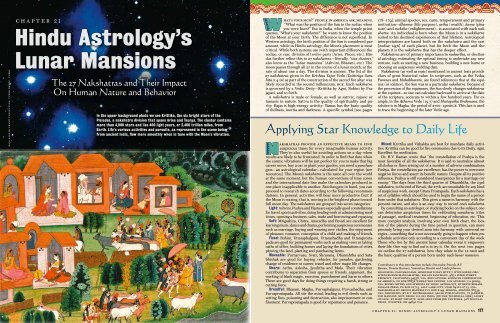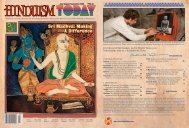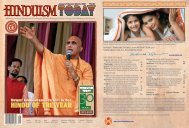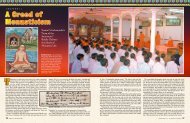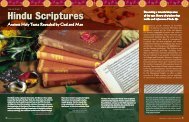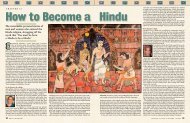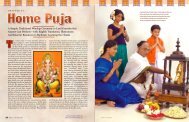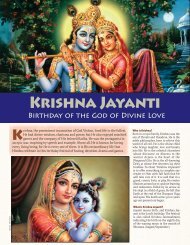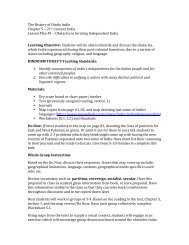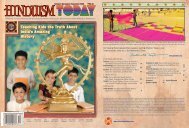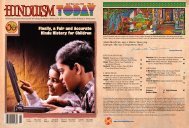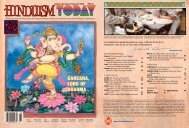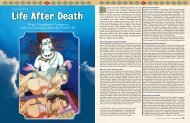Hindu Astrology's Lunar Mansions - Hinduism Today Magazine
Hindu Astrology's Lunar Mansions - Hinduism Today Magazine
Hindu Astrology's Lunar Mansions - Hinduism Today Magazine
Create successful ePaper yourself
Turn your PDF publications into a flip-book with our unique Google optimized e-Paper software.
aja sansar chand collection; upper photo, corel<br />
Chapter 21<br />
<strong>Hindu</strong> Astrology’s<br />
<strong>Lunar</strong> <strong>Mansions</strong><br />
The 27 Nakshatras and Their Impact<br />
On Human Nature and Behavior<br />
In the upper background photo we see Krittika, the six bright stars of the<br />
Pleiades, a nakshatra division that spans Aries and Taurus. The cluster contains<br />
more than 4,000 stars and lies 400 light years, or 2,400 trillion miles, from<br />
Earth. Life’s various activities and pursuits, as represened in the scene below<br />
from ancient India, flow more smoothly when in tune with the Moon’s vibration.<br />
What’s your sign?” people in america ask, meaning,<br />
“What was the position of the Sun in the zodiac when<br />
you were born?” But in India, when the temple priest<br />
queries, “What’s your n a k sh a tra? ” he wants to know the position<br />
of the Moon at your birth. the difference is not superficial. In<br />
Western astrology, the birth position of the Sun is considered paramount,<br />
while in hindu astrology, the Moon’s placement is most<br />
critical. While both systems use (with important differences) the<br />
zodiac, or rasi,division of twelve parts (aries, pisces, etc.), hindus<br />
further refine this to 27 nakshatras—literally, “star clusters,”<br />
also know as the “lunar mansions” (ashvini, Bharani, etc.). the<br />
moon passes through all 27 in the course of a lunar month, at the<br />
rate of about one a day. the division is ancient. the list of the<br />
27 nakshatrasgiven in the KrishnaYajurVeda(TaittiriyaSamhita2.4.10)<br />
as part of the construction of the sacred fire altarwas<br />
likely recorded in the second millennium, bce. each nakshatrais<br />
governed by a Vedic Deity—Krittika by agni, rohini by prajapati,<br />
and so forth.<br />
a nakshatrais male or female, as well as sattvic, rajasic or<br />
tamasic in nature. Sattva is the quality of spirituality and purity.<br />
rajas is high-energy activity. tamashas the basic quality<br />
of dullness, inertia and darkness. a specific symbol [see pages<br />
Nakshatras provide an effective means to find<br />
auspicious times for every imaginable human activity.<br />
they’re also useful for avoiding actions on a day when<br />
results are likely to be frustrated. In order to find that date when<br />
the cosmic vibrations will be just perfect for you to make that big<br />
career move, buy a car or plant your garden, you need a panchangam—an<br />
astrological calendar—calculated for your region [see<br />
resources]. the Moon’s nakshatrais the same all over the world<br />
at the same moment, but the human conventions of time zones<br />
and the international date line make the calendars produced in<br />
one place inapplicable to another. Panchangamin hand, you can<br />
proceed to research dates according to the following re com mendations.<br />
In general, activities will bear more productive fruit if<br />
the Moon is waxing, that is, moving in the brightest phase toward<br />
full moon day. the nakshatrasare grouped into seven categories:<br />
Light: ashvini, pushya and hasta are especially good constellations<br />
for travel, sports activities, doing healing work or administering medicines,<br />
opening a business, sales, trade and borrowing and repaying.<br />
Soft: Mrigashira, Chitra, anuradha and revati are excellent for<br />
learning music, dance and drama, performing auspicious ceremonies<br />
such as marriage, buying and wearing new clothes, the enjoyment<br />
of pleasure, romance, conception of a child and making of friends.<br />
Fixed: rohini, Uttaraphalguni, Uttarasha dha and Uttaraprostapada<br />
are good for permanent works such as making vows or taking<br />
oaths of office, building homes and laying the foundations of cities,<br />
plowing the land, planting and purchasing farms.<br />
Moveable: purnarvasu, Svati, Shravana, Dhanishtha and Satabhishak<br />
are good for buying vehicles, for parades, gardening,<br />
change of residence or career, travel and other major life changes.<br />
Sharp: ardra, aslesha, Jyeshtha and Mula. their vibration<br />
contributes to separation from spouse or friends, argument, the<br />
working of black magic, exorcism, punishment and harm to others.<br />
these are good days for doing things requiring a harsh, strong or<br />
cutting force.<br />
Dreadful: Bharani, Magha, purvaphalguni, purvashadha, and<br />
purvaprostapada. all stir the mind, leading to evil deeds such as<br />
setting fires, poisoning and destruction, also imprisonment or confinement.<br />
purvaprostapada is good for repentance and penance.<br />
178–179], animal species, sex, caste, temperament and primary<br />
motivation—dharma(life purpose), artha(wealth), kama(pleasure)<br />
and moksha(enlightenment)—is associated with each nakshatra.an<br />
individual is born when the Moon is in a nakshatrasuited<br />
to his destined experiences of that lifetime. astrological<br />
interpretations are based both on the nakshatraand the rasi<br />
[zodiac sign] of each planet, but for both the Moon and the<br />
planets it is the nakshatrathat has the deeper effect.<br />
Nakshatrasare of primary importance in muhurtha,or electional<br />
astrology, estimating the optimal timing to undertake any new<br />
venture, such as starting a new business, building a new home or<br />
choosing an auspicious wedding date.<br />
Nakshatras(as well as rasis) mentioned in ancient texts provide<br />
clues of great historical value. In scriptures, such as the Vedas,<br />
Puranasand Mahabharata,are found references that at the equinox<br />
(or solstice), the Sun was in a particular nakshatra.Because of<br />
the precession of the equinoxes, the Sun slowly changes nakshatrasat<br />
the equinox—so one can calculate backward to arrive at the date<br />
of the scripture, accurate to within a few hundred years. For example,<br />
in the AtharvaVeda(19.7) and ShatapathaBrahmana,the<br />
solstice is in Magha, the period of 2700–1900bce. this fact is used<br />
to trace the beginning of the later Vedic age.<br />
Applying Star Knowledge to Daily Life<br />
Mixed: Krittika and Vishakha are best for mundane daily activities.<br />
Krittika can be good for fire ceremonies due to its Deity, agni.<br />
excellent for meditation.<br />
Dr. B.V. raman wrote that “the constellation of pushya is the<br />
most favorable of all the nakshatras.It is said to neutralize almost<br />
all doshasor flaws arising out of a number of adverse combinations.<br />
pushya, the constellation par excellence, has the power to overcome<br />
negative forces and assert its benefic nature. Despite all its positive<br />
influence, pushya is still considered inauspicious for a marriage ceremony.”<br />
the days from the third quarter of Dhanishtha, the 23rd<br />
nakshatra,to the end of revati, the 27th, are unsuitable for any kind<br />
of auspicious work, except Uttara prostapada. each nakshatrahas a<br />
set of syllables which should be used to begin the name of a person<br />
born under that nakshatra.this gives a name in harmony with the<br />
person’s nature, and also is an easy way to record one’s nakshatra.<br />
By consulting an astrologer, or studying books on the subject, one<br />
can determine auspicious times for celebrating samskaras(rites<br />
of passage), medical treatment, beginning of education, etc. this<br />
more complex analysis, involving your own birth chart, the location<br />
of the planets during the time period in question, can more<br />
precisely bring your desired aims into harmony with universal energies—something<br />
that is not necessarily going to happen when you<br />
schedule activities only according to a convenient day of the week.<br />
those who live by this ancient lunar calendar swear it empowers<br />
their life. One way to find out is to try it. On the next two pages<br />
we outline the 27 nakshatras, how they relate to the 12 rasisand<br />
the basic qualities of a person born under each lunarmansion.<br />
ContributorstothisintroductionincludeDevendraTrivedi,B.V.<br />
Raman,DennisHarness,VamadevaShastriandLindaJohnsen.<br />
resources: panchangams: hinduism today http:// www.hindu.org/<br />
sciences/panchangam.html; palani panchang, 4831 piper street,<br />
fremont, california 94538, usa. educational sciences corporation<br />
of america, po box 88852 world way center, los angeles, ca 90009,<br />
usa, books: myths and symbols of vedic astrology, by bepin behari,<br />
passage press, po box 21713, salt lake city, utah 84121-0713, usa;<br />
nakshatras by dennis harness p.o. box 2149, sedona, arizona 86339<br />
usa; nakshatra, by k.t. shubhakaran, sagar publications, 72 janpath,<br />
ved mansion, new delhi 110 001 india [on the technical side]; light<br />
on life, by hart defouw, available from jdr ventures, 918 douglas<br />
drive, wooster, oh 44691 usa.<br />
chapter 21: hindu astrology’s lunar mansions 177
Character Influences<br />
Of the Nakshatras<br />
A terse summary of the nature and<br />
tendencies of persons born when the moon<br />
is located in each of the 27 lunar mansions<br />
1. Ashvini (Beta Arietis): passionate, impulsive, attractive and intelligent,<br />
people whose birth Moon is in ashvini can also be headstrong<br />
and extravagant. they enjoy travel, are often skilled workers,<br />
and may have healing abilities. the ashvins are Vedic gods of<br />
light, healing and inspiration.<br />
2. Bharani (41 Arietis): Bharani folk are usually healthy, happy,<br />
skillful and conscientious. they also tend to be somewhat impatient<br />
and self-indulgent, and find it hard to forgive. Setbacks can<br />
shift their priorities from material preoccupation to spiritual<br />
transcendence.<br />
3. Krittika (Alcyone 2-Pleiades): Krittika types are fiery, full of<br />
creative energy, highly ambitious, dedicated to divine service,<br />
self-motivated and “think big.” they stand out in a crowd and<br />
can become quite famous. they’re prone to eating too much.<br />
4. Rohini (Aldebaran): rohini gives a loving, truthful disposition,<br />
serenity, a sense of responsibility and a love of the arts, beauty<br />
and culture. If the Moon is afflicted, they may be prone to stubbornness,<br />
anger, selfishness and fault-finding.<br />
5. Mrigashira (Lambda Orionis): Gentle, sensitive, highly perceptive,<br />
drawn to romance, music and the arts, Mrigashiras prefer<br />
a quiet, comfortable life, can be very hard working and are frequently<br />
drawn to spiritual life. Some are haunted by self-doubt<br />
or egoity.<br />
6. Ardra (Betelguese 7): Full of vitality, good athletes, ardras<br />
live life with enthusiasm and intensity. Sympathetic and helpful,<br />
they’re often drawn to the study of esoteric laws. If the Moon is afflicted,<br />
they can be cruel, lashing out at others unfairly at times.<br />
7. Punarvasu (Pollux 11): Good-natured, generous emotionally,<br />
prudent financially, content to live a relaxed, uncluttered life, selfdisciplined,<br />
yet playful. they need to guard against complacency<br />
and watch their health. they make good friends.<br />
8. Pushya (Delta Cancri): they are stable, easy going personalities,<br />
prosperous, well educated, popular, virtuous, nice looking, forthright,<br />
intelligent and wise. Can be overly rigid, selfish and arrogant.<br />
productive and caring people who make good teachers.<br />
9. Ashlesha (Epsilon Hydrae): Self-reliant, excellent communicators,<br />
capable of great concentration and penetrating insight. their<br />
candor can turn to tactlessness, and they may manipulate truth to<br />
protect themselves. Don’t humiliate them; they will never forget it.<br />
10. Magha (Alpha Leonis): regal, ambitious, pleasure loving, physically<br />
strong, they easily rise to leadership positions, honor tradition<br />
and pursue noteworthy projects. they enjoy being served more<br />
than serving, and they can fall prey to a voracious desire for sex.<br />
11. Purva Phalguni (Delta Leonis): Magnanimous, loyal, delightful<br />
conversationalists, earthy, attractive. they get their way without<br />
intimidating others. Often they are wanderers, drawn to the arts,<br />
and enjoy life to the full. the body is usually healthy, but the<br />
mind is so active and creative, they tend to leap before looking.<br />
12. Uttara Phalguni (Beta Leonis): Likeable, generally well-to-do,<br />
earning substantial salaries through their exceptional intelligence.<br />
Make wonderful friends, and are always ready to help their com-<br />
178 what is hinduism?<br />
Aslesha<br />
Magha<br />
Pushya<br />
Purva Phalguni<br />
Punarvasu<br />
Uttara Phalguni<br />
Ardra<br />
Hasta<br />
Mrigashira<br />
Leo<br />
Chitra<br />
Cancer<br />
Rohini<br />
Gemini<br />
panions. Success, courage<br />
and love of adventure may<br />
appear, but romantic escapades<br />
may lead to trouble.<br />
13. Hasta (Delta Corvi): hard working,<br />
industrious and exceptionally resourceful, they<br />
make fine artisans, specialists, business people and<br />
teachers, but are not often leaders. May display intelligence, a<br />
sharp wit and healing ability, also a lack of patience, and a determined<br />
effort to manipulate others for their own ends.<br />
14. Chitra (Spica 16): Charming and stylishly dressed, drawn to<br />
anything new or out of the ordinary. Magnets to the opposite sex,<br />
often artistically gifted, they surround themselves with beautiful<br />
things. May at times become self-indulgent. these are intelligent,<br />
Virgo<br />
Svati<br />
Krittika<br />
Taurus<br />
Libra<br />
Vishakha<br />
Aries<br />
Scorpio<br />
Anuradha<br />
Bharani<br />
Pisces<br />
Sagittarius<br />
Ashvini<br />
Jyeshtha<br />
WithEarthinthecenter,thisdiagramdepictsthe12rasis, orsigns,ofthezodiac,surroundedbythe27nakshatras,accordingtotheirrelativelocationintheheavensasseenfromEarth.Eachnakshatrahasasymbolrelatedeithertoitssubtlevibration<br />
Revati<br />
Capricorn<br />
Mula<br />
Aquarius<br />
ortotheshapeofanearbyconstellationofstars.TheMoon’slocationatbirthalongthisancientdivisionoftheecliptic,says<strong>Hindu</strong>astrology,isaprime<br />
Uttara Prostapada<br />
Purvashadha<br />
a. manivel<br />
indicationofaperson’sbasiccharacteristicsTherearealsofourequaldivisionswithineachnakshatra,makingatotalof108expressionsofhumannature.Notednexttoeachnakshatra<br />
name inthedescriptionsbelowisthestarwithwhichitisassociated.Thereare2-1/4<br />
Purva Prostapada<br />
honest, efficient,<br />
substantial people.<br />
15. Svati (Arcturus 17):<br />
Independent, generally quiet,<br />
nice people who control themselves<br />
in public. they are helpful, pleasant conversationalists<br />
and rarely hold grudges. Like travel<br />
and strongly attracted to religion or philosophy. Sometimes they<br />
experience chronic discontent.<br />
16. Vishakha (Alpha 2 Libra): purposeful, forceful, commanding in<br />
appearance. excellent public speakers who enjoy making money.<br />
Courage, ambition and one-pointedness carry them quickly to<br />
their goals. they revel in turmoil and enjoy a good argument.<br />
17. Anuradha (Delta Scorpio): Well-to-do, they dislike austere life-<br />
Uttarashadha<br />
nakshatras perzodiacsign.<br />
Satabhishak<br />
Shravana<br />
styles, but have a deep spiritual nature. they value family and<br />
friends, enjoy organizing projects and managing people. the<br />
less mature are prone to jealousy and depression.<br />
18. Jyeshtha (Antares 18): Deeply passionate, able leaders,<br />
re nowned for their adherence to virtue—and their testy<br />
temperaments! Generally cheerful, but quite irascible when<br />
provoked, they gladly fight to defend the helpless.<br />
19. Mula (Lambda Scorpii): Set in their ways, clever, soft<br />
and happy disposition, but somewhat suspicious of other<br />
people’s motivations. they tend to find their way to money,<br />
or money finds its way to them.<br />
20. Purvashadha (Delta Sagittarii): patient, independent<br />
minded, convincing in speech, proud, lucky in love, outgoing<br />
people who will stick with their friends. Value their<br />
own opinions over other’s.<br />
21. Uttarashadha (Pi Sagittarii): popular, idealistic, influential,<br />
stable, introspective and ethical. Good both at<br />
starting projects and completing them. Drawn to work<br />
which uplifts others. the less mature may be lazy, easily<br />
distracted or stressed out.<br />
22. Shravana (Altair 20): Intelligent, well-educated, and<br />
prosperous. a degree of fame usually comes their way. they<br />
love to learn, make good teachers and enjoy traveling. Often<br />
drawn to religious life, or a life of service, but they may become<br />
rigid or fanatical.<br />
Dhanishtha<br />
23. Dhanishtha (Alpha Delphini): Courageous, generous, often<br />
prosperous, upbeat, ambitious and with a universal outlook.<br />
they bring people together for a worthy cause. Not easily fooled,<br />
they carefully analyze any proposition put to them. Can be aggressive,<br />
rash or overly conservative.<br />
24. Satabhishak (Lambda Aquarii): Blunt but honest, disinclined<br />
to conform, almost always get their way. Drawn to fields requiring<br />
penetrating insight such as science or philosophy. Can become<br />
a mindless workaholic, private, hiding their real thoughts.<br />
Most devoted to service of humanity, whether recognized or not.<br />
25. Purva Prostapada (Beta Pegasi): Fine speakers, good business<br />
skills, can make money and hang onto it. Generally fairly serious<br />
people, yet may act impetuously or have a hard time sticking to<br />
a decision. the less mature can be phobic, cynical or may strike<br />
out vindictively at others.<br />
26. Uttara Prostapada (Gamma Pegasi): Well-balanced and ethical<br />
people, kindly, self-sacrificing, supportive, very convincing<br />
in discussions. they sincerely enjoy family life and like to help<br />
others. When conflicts or competition arise, they are likely to<br />
hold the winning hand. Young souls can be lazy, irresponsible<br />
and envious.<br />
27. Revati (Zeta Piscium): healthy, intelligent, with a sweet disposition<br />
and artistically gifted, they love people, wish harm to no<br />
one and nourish those in need. While they don’t seek much for<br />
themselves, wealth and joy are often spontaneously bestowed<br />
on them. the less mature may display an inferiority complex, a<br />
servile nature, or fall prey to continual disappointments.<br />
chapter 21: hindu astrology’s lunar mansions 179


